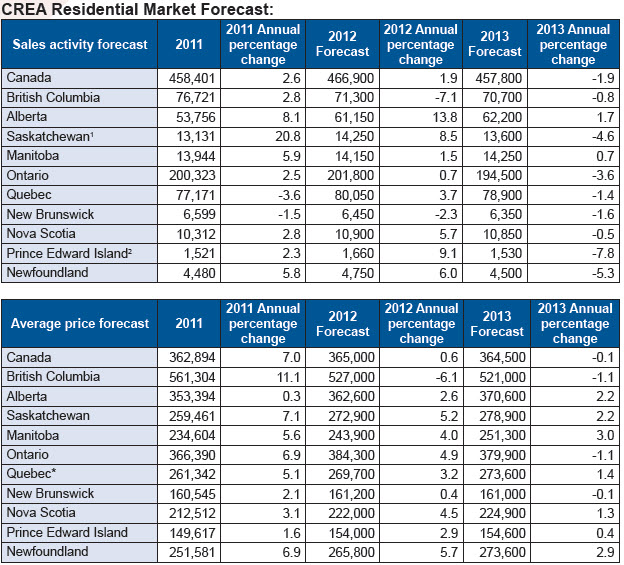Will house prices start to come down across Canada?
Wednesday, September 26th, 2012Canada’s housing market appears to be cooling across the board in the face of tighter mortgage rules that affect many first-time buyers of modest means, a new analysis from the Conference Board shows.
The think-tank’s snapshot of resales for August shows a widespread decline in sales of existing homes, with 21 of 28 metropolitan markets registering a drop from July, and 16 of the markets showing a falloff of five per cent or more.
As well, listings fell in 17 of the 28 markets, an indication that owners were reluctant to place their homes for sale due to soft conditions.
Senior economist Robin Wiebe of the Conference Board said there was evidence of cooling in some markets — particularly Vancouver and Victoria — before the new rules went into effect July 9. But the new data shows the slowdown has spread to most markets and from coast to coast.
“When you see sales down in three-quarters of the market, that means it’s pretty widespread,” he said. “It’s knocked down previously high-flying markets like Regina and Saskatoon down a peg. Vancouver had been showing signs of cooling, now it’s spread out into the Fraser Valley.”
At the time Finance Minister Jim Flaherty announced a maximum amortization period for mortgages would be reduced to 25 years from 30 years, the government estimated it would increase monthly payments by $184 on a $350,000 mortgage.
It had been the fourth time Flaherty tightened mortgage requirements in four years, but the July measure was regarded as the one likely to be the most effective.
While sales and prices were only temporarily sidetracked by the previous announcements, only to recover a few months later, this might “be the one that broke the camel’s back,” said Wiebe.
Last week, the Canadian Real Estate Association reported that sales of existing homes fell 5.8% in August from July, and were down 8.9 per cent from August 2011.
Still, the latest data shows that while sales and listings are down, prices appear to be holding steady.
The report found prices fell in only nine of the 28 markets in August from the previous month. Compared to last August, prices were up in 25 markets.
Economists have generally been forecasting a correction of between 10 and 25% in prices over the next two or three years. Vancouver, which had for years been Canada’s hottest market, has seen a tumble of about 30 per cent in resale homes.
But Wiebe is not so sure the correction will be as severe as many predict, or that Vancouver’s market is as cold as the numbers suggest.
He notes that Vancouver’s average home prices are skewed by the number of high-end properties sold — many to investors from China. Both the meteoric rise and current decline are “overstated,” he said.
Homes in the Toronto area, Canada’s largest market, are also likely to retain their value, he said, because the economy in the city remains healthy and the greater metropolitan area continues to experience strong population growth.
Source: Julian Beltrame, Canadian Press




